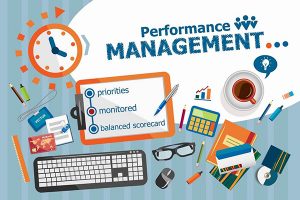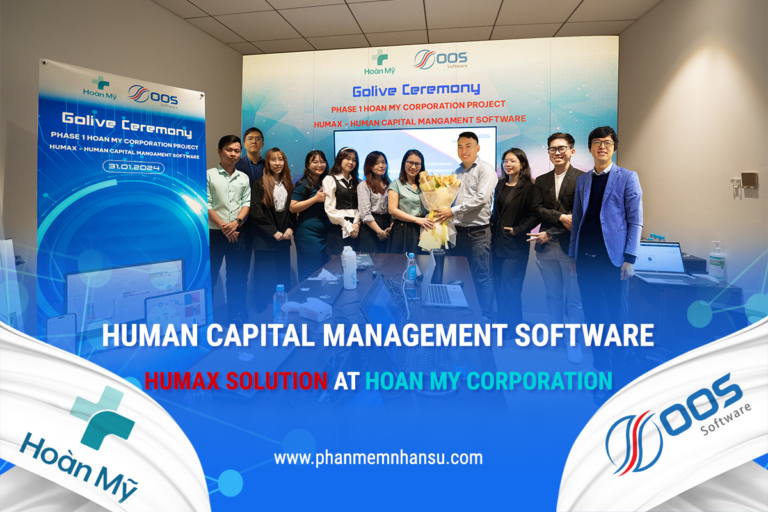Performance managementt is an important factor that creates the foundation for more successful businesses. So what exactly is this? How is the process done? All will be answered right in the following article.
What is performance management?
Performance Management whose English name is "Performance Management" is a regular communication process between managers and employees to improve work productivity by setting goals for departments and individuals in line with strategic goals. general of the enterprise.

The purpose of performance management is to:
- Improve work results
- Minimize costs and resources needed to achieve the same results as the original KPI
- Optimizing the resources of the business, saving the resources to spend
- Review and evaluate work progress, support employee knowledge and skill development
This process needs to take place continuously in the spirit of open dialogue between management and employees, clarifying the expectations of both sides to set reasonable and achievable goals.
Learn more about effective performance management in your business
Benefits of performance management
The team is united towards a common goal
When business performance management To be effective, all employees must align their personal goals with the overall goals of the enterprise. When employees accomplish their own goals that are aligned with the overall goals of the public, the results are valuable in terms of performance, recognized by the business.
Therefore, performance management gradually helps businesses form a culture towards common goals, creating a solid foundation for sustainable development.
Drive business results
Managers base on the business performance index to set goals, orient the development of business activities of the enterprise in a stronger and more balanced way.

When the business is on a strong growth momentum but the human resources are not enough to meet the requirements, you can recruit more employees to expand the scale. Or if employees are lacking in work goals, low performance, etc., businesses can focus on marketing activities, increase customers and projects, and help employees work efficiently and productively.
Efficient use of human resources
Performance management is also the process by which managers must develop and effectively use human resources. Work results are only really quality when personnel are assigned to the right people, to the right jobs. This is the key to help businesses open the door to sustainable development in the future.
Promote employee creativity
When the business implements governance, employees will enter the commitment stage to improve performance. On average, as long as employees increase their productivity by 1%/day/week, your business has been growing well.

To meet the set goals, employees must promote creativity at work, adhere to discipline and be more engaged with each other. In particular, when focusing on achieving performance, employees will know clearly in which direction they need to develop, know what should and shouldn't do.
4 steps to building an effective performance management process
Here is the step-by-step process to build the best performance management process for businesses today:

Build a plan
Planning is the most important step in the process performance management. This activity is likened to building a foundation for a house, creating the most solid foundation for a business over time. In this step, the management levels need to agree on the goals to be achieved and the implementation plan.
After determining the common goal, the enterprise needs to publicly and transparently announce it to all employees. Usually, the goals revolve around expanding the market, increasing revenue, increasing profits, developing human resources, etc. In particular, these goals must be associated with the long-term development orientation of the enterprise. .

For effective planning, businesses can refer to the SMART model. This model helps your business plan to develop in accordance with reality and many internal things that the business needs. SMART stands for:
- S – Specific: Specific
- M – Measurable: Can be measured
- A – Attainable: Make it possible
- R – Relevant: A Practical Way
- T – Time-bound: There is a deadline to complete
Implement the plan
Based on the established goals, the management levels of the enterprise assign work to departments, departments and individuals, and carry out the implementation of the plan according to the planned time limit.

Monitor progress
In the process of achieving goals, employee performance is easily affected by many factors. Therefore, all levels of management need to monitor the progress closely and do the following 3 things:
- Monthly and quarterly monitoring to ensure all employees are working on schedule and in the right direction. The monitoring cycle should not be too long because it reduces the value of the monitoring, and the problems and problems that arise cannot be overcome in time. The supervision should be done in the spirit of finding out the shortcomings so that they can be promptly removed and resolved.

- Accompany employees by supporting them enthusiastically to achieve the best work results. Monitoring should not be turned into an activity that puts pressure on your employees.

- Adjust the target in time when the market changes. This is an important and meaningful step in the monitoring process, both helping employees complete the work as planned and ensuring a suitable, flexible, and non-mechanical result.
For the monitoring process to be effective and convenient, businesses can refer to the SMARTER model. This model is established and monitored for the implementation of goals associated with the evaluation and adjustment of the goals when necessary. SMARTER can help the entire business implement the plan effectively and efficiently in the most suitable conditions.
Evaluate the effectiveness
Last step in the process performance management An enterprise is an assessment and feedback to have more accurate bases to recognize the work performance, results and efforts of each employee.
To evaluate effectiveness, you can apply the following set of questions:
- Are the goals set at the beginning consistent with the actual situation?
- Are the goals aligned with the overall company goals?
- Does the employee learn more skills, gain more experience, or not?
- How did the employee complete the assigned work at a pass/fail/excellent level?
- Does the company provide timely support for employees to achieve their goals?
- In the future, how should the goals be adjusted to increase efficiency?
- What work or aspect needs improvement, needs to be streamlined?

When conducting feedback and evaluating results, managers also need to give worthy rewards to employees who work effectively to encourage work morale, increase employee motivation in projects. next judgment.
Rewarding should be done in accordance with regulations, fair and transparent so that employees feel recognized. With employees who have not done well, there will be more motivation to make efforts. Besides bonus money, businesses can also give away trips, vacations, certificates of merit, medals, ....

For employees who have not yet achieved their work performance as set out goals, managers should give 1:1 feedback in the spirit of listening, assisting in solving and solving problems, so that employees feel valued. use, not alone in the upcoming journey.
>>> Don't miss: 7 Steps risk management Indispensable efficiency for businesses
Elements for effective performance management
Here are five factors to help make performance management the most effective:
- Set goals and plans
- Recognition of employees' dedication
- Feedback, evaluation objectively, accurately
- Transparency in communication
- Improve skills for employees
Set goals and plans
To performance management To be effective, all levels of management need to convey complete and detailed information to employees. At the same time, explain for employees to understand the importance of the plan, helping to create more motivation for employees to work hard and make efforts.

To build effective goals, management collaborates with employees, creating conditions for employees to contribute and build to help the plan be implemented smoothly.
Recognition of employees' dedication
After evaluating the effectiveness of the project, the enterprise needs to recognize the employee's contributions to that plan and goal. Rewarding outstanding, dedicated employees will help them feel recognized, valued, and motivate themselves and other employees to strive for growth.
Feedback, evaluation objectively, accurately
Would like performance management To be specific, the manager needs to regularly respond to the plan in the most objective way. This is a way to evaluate the progress of the implementation process, help employees understand the problems that arise and make adjustments accordingly.
Transparency in communication
All information about the plan should be provided fully, accurately and timely to the personnel involved in the plan. This helps employees understand the information and understand the whole thing right from the beginning so that the implementation phase can be quick and effective. Managers need to share transparency for employees to create a sense of trust for both sides.

Improve skills for employees
Every employee wants to improve knowledge and learn every day. Therefore, business managers need to regularly train skills and knowledge in their work to help them progress and develop more.
Performance Management is a must-have activity at enterprises, bringing many benefits in the direction of general growth and sustainable development. In order for the management process to be effective, businesses need to understand the steps that need to be taken for the most effective management.























